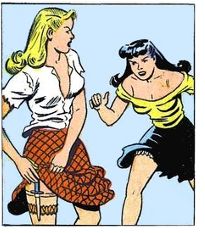 We get lots of mail asking for Discussion Questions for mysteries, and there've been a lot of them lately—emails AND new crime novels (all claiming to be the "new" Gone Girl).
We get lots of mail asking for Discussion Questions for mysteries, and there've been a lot of them lately—emails AND new crime novels (all claiming to be the "new" Gone Girl).
Sadly, for book clubs, authors or publishers don't often issue questions for mysteries—for a couple of reasons:
♦ Specific questions tend to give away the plot, ruining the element of surprise. Remember, mysteries depend on withholding information.
♦ Bestselling crime novels aren't considered "book club" material. They're all about plot and don't necessarily open themselves up to discussions about character dynamics or weighty social issues. Major serial authors like James Patterson, Michael Connelly, J.D. Robb, David Baldacci write for different reasons and audiences.
So we've got our own questions below. Feel free to use them or access them here.
Questions for Mystery - Crime - Suspense - Thrillers
1. Talk about the characters, both good and bad. Describe their personalities and motivations. Are they fully developed and emotionally complex? Or are they flat, one-dimensional heroes and villains?
2. What do you know...and when do you know it? At what point in the book do you begin to piece together what happened?
3. Good crime writers embed hidden clues, slipping them in casually, almost in passing. Did you pick them out, or were you...clueless? Once you've finished the book, go back to locate the clues hidden in plain sight. How skillful was the author in burying them?
4. Good crime writers also tease us with red-herrings—false clues—to purposely lead us astray? Does your author try to throw you off track? If so, were you tripped up?
5. Talk about the twists & turns—those surprising plot developments that throw everything you think you've figured out into disarray.a. Do they enhance the story, add complexity, and build suspense?
b. Are they plausible or implausible?
c. Do they feel forced and gratuitous—inserted merely to extend the story?
6. Does the author ratchet up the suspense? Did you find yourself anxious—quickly turning pages to learn what happened? A what point does the suspense start to build? Where does it climax...then perhaps start rising again?
7. A good ending is essential in any mystery or crime thriller: it should ease up on tension, answer questions, and tidy up loose ends. Does the ending accomplish those goals?a. Is the conclusion probable or believable?
b. Is it organic, growing out of clues previously laid out by the author (see Question 3)?
c. Or does the ending come out of the blue, feeling forced or tacked-on?
d. Perhaps it's too predictable.
e. Can you envision a different or better ending?
8. Point to passages in the book—ideas, descriptions, or dialogue—that you found interesting or revealing, that somehow struck you. What, if anything, made you stop and think? Or maybe even laugh.
9. Overall, does the book satisfy? Does it live up to the standards of a good crime story or suspense thriller? Or does it somehow fall short?
10. Compare this book to other mystery, crime, or suspense thrillers that you've read. Consider other authors or other books in a the series by the same author.
(Questions by LitLovers. Please feel free to use them, online or off, with attribution. Thanks.)
 This just in: A Facebook friend wrote asking about the use of Kindles and other e-book devices in her book club.
This just in: A Facebook friend wrote asking about the use of Kindles and other e-book devices in her book club.
A good friend and I are starting a book club, and someone has asked if she can use her Kindle. Although I don't see a problem, my co-founder says, "Definitely not." What are your thoughts? Any advice would help.
The problem the friend has with Kindles, apparently, is her fear that e-readers are putting bookstores out of business. So a compromise was reached: use your Kindle at home, but just don't bring it to the book club.
Wanting to save bookstores is a laudable concern. But the club's solution—use your Kindle, just don't let us see you do it—is like closing your eyes against a tsunami: if you don't see it, maybe it's not happening.
Tough issues—preserving tradition vs. moving into the future. But both the future and technology are unstoppable—technology IS a tsunami ... and it WILL engulf everything in its path. One need only took to history: ♦ scroll → book ♦ buggy → auto ♦ movies → tv ♦ mailbox → inbox.
Still, there's room for books and e-readers. Scroll down to the blog post right below this one, BOOKSTORES MAY STICK AROUND AFTER ALL. The past five years it seems have seen real growth in their numbers.
So what do you think? Do your book club members use Kindles?

We got some guff from guys objecting to our tale of woe—the woman's book club who invited their husbands to join. Well, here's the other side—here's what happens when MARS opens its door to VENUS.
Book Club Calendar
 "First the RULES," the ladies tell us— NO T-shirts. NO cigars. :-( |
 50 Shades—whoa! Hot. Who knew? :-) |
NO BEER??? A nice Merlot...? What the hell's a Merlot? |
 YES! The Masters!! Whaddya mean we can't reschedule? Whyyyyyy? |
 Nicholas Sparks? Again? Are you KIDDING? |
 We go "as a club" to see The Help. It feels, eh…girly. |
A picnic. We wear T-shirts! We drink beer!! We are MEN!!! |
No sci-fi, no westerns, no spy thrillers. Not one work of history. |
Q: What's the difference between History and historical fiction? A: ROMANCE. |
| Breakthrough! What women call Romance, we call Soft Porn. High Five, guys! |
Our 4th book on Tudor England. Shoulda seen it coming. |
Christmas party: $150/couple plus $35 gift. That's it, we're outta here. |
 |
 Superbowl—yes. Tudors—no. Sparks—never. Who's got beer? |
 |

Thinking of inviting your husbands to join your book club? Well, think again, Dear Reader. Take a look at a sorry tale of ONE LITTLE CLUB that thought it could.
Book Club Calendar
 Happy New Year! Our husbands join our club for the first time! |
 Great meeting! The guys get along really well. They're adorable! |
No more brie & bruschetta. They want beer & pizza. Um...sure, why not? |
 No Nicholas Sparks. EVER. Or they walk. Okay...we're flexible. :-) |
 Quite a year so far …what with books on football, golf, & lawncare. |
 Two couples couldn't find sitters—had to bring the kids. No problem. |
Sonia watches the kids. The rest of us discuss Sports Illustrated's swimsuit issue. |
Everyone shows up with kids. There're just..... so MANY. Omg. |
Meeting cancelled. Runny noses & strep. The whole club's infected. |
| Back together again! Need volunteers to watch the kids. Men don't budge. |
One kid screams, they ALL scream. Men don't hear a thing. Not. 1. Thing. |
Women & kids at home. Men get together for beer & pizza. Merry Christmas. |
 |
 Happy New Year! We'll be devoting the entire year to NICHOLAS SPARKS. Objections? Too bad. |
 |
Find out what happens when the men's book club invites the wives.
 Dullsville. Has your club run out of gas? Stuck in a rut—doing the same-old, same-old? Take a look at a letter from our mailbag.
Dullsville. Has your club run out of gas? Stuck in a rut—doing the same-old, same-old? Take a look at a letter from our mailbag.
I have been a member of a book club for 12 years. Several of us have been talking and feel the group has become "stale." We've been doing the same thing year after year—and no one has any new ideas. Any suggestions on how we could shake things up?
Shaking things up often means forgetting about the book and stepping out of the pages. Or it might mean talking about books in a different way. Here are several ideas which any club could try, tired or not.
- Come as You Are
Like a come-as-you-are party, each member talks (briefly) about the book s/he's reading at the moment. (Don't assign a book for that month.) Or identify a unifying theme—families, coming of age, mystery, historical, etc.—and have members find their own books based on the theme to share with the group. - Film Night

Devote a meeting to movies & popcorn. Have members bring their favorite film-adaptations and play a clip. If everyone shows up with The Help ... have each member pick out a favorite scene. Or watch a single movie in its entirety...and compare it with the book. - Read To the Elderly
Make arrangements with a local nursing home to read to patients. Go as a group and fan out, each reading to someone different. Find light-hearted books like Irma Bombeck with short, humorous chapters. Even for stroke patients with little comprehension, the stimulation of hearing someone's voice can be helpful. - Auteur! Auteur!
Write a book together. One of our Featured LitClubs started a "chain book"—each member built on a chapter from the previous writer. Be as silly or as irreverent as you want. Come up with a romance...a mystery...sci-fi...or combine a number of genres and see what comes out!  International Night
International Night
Dispense with reading for a month and host a dinner to which members bring dishes from the different countries (or regions) represented in the books you've read over the years. Members might bring artifacts...music...photos...or some representation of the culture.- Costumes
Have one meeting in which everyone comes dressed as a favorite character from any of the books you've read—or perhaps carrying some representative object. Members try to guess the identities of each other's characters...or not. - A Night On the Town
See a film or stage play together. Visit a bookstore or spend an evening at a library prowling the stacks together. Attend a lecture if there's a locally sponsored author series. Just break the routine...and GET OUT of the house! - Arts & Crafts
Perhaps there's a book which has some tie-in with an A&C project you could do together—origami cranes, for instance, for The Echo Maker. Or work together on a club scrapbook, each taking a page for one of the books you've read...or a specific year...or club event. There's nothing more fun than sitting around a table working together as a group. - Games & Icebreakers
Do check out our literary games page...and check out some of our featured book clubs to see what they've done. Lots of good ideas.
For any group that's gone a little flat, my advice is to take a break from reading every now and then. Do something completely different.
 You're unhappy with your book club...and another one beckons. What do you do?
You're unhappy with your book club...and another one beckons. What do you do?
I'm not enjoying my book club anymore. Let's just say we have different styles. I like the women; in fact, some have become friends. But there's another group that's asked me to join them, and I think I would be a lot happier in that group. How do I get out of the first club—without hurting feelings?
Wanting out of a book club isn't uncommon—there are plenty of legitimate reasons. But leaving one club for another...? It's like a divorce.
Unlike marriage, though, you didn't take a lifelong vow. So if your expectations aren't being met, and another group might be a better fit, then make move. It won't be easy, but there are ways to limit the fallout—not eliminate it, just minimize it.
Tell a white lie. Maybe the meetings no longer fit your schedule: work, child care, travel. Or perhaps you're finding it increasingly hard to do the reading—though that excuse falls apart if and when your current club learns you've joined another one.
Honesty is best, of course. Seek out the members you consider friends—they've probably got an inkling, right? But whatever you say, even to them, do NOT denigrate the group. Even good friends are not always discreet. And, besides, it's still their club—they're not leaving.
The safest track is to say you haven't found the books personally appealing. Maybe they're too long or too difficult. Or maybe just the opposite: you like books that delve into controversial or philosophical ideas. The reasons are up to you. Just don't talk about wanting "better written" books or resenting the "poorly written" ones the group has selected. That's a no-no.
If it's not the books but certain individuals, or the discussions themselves, you're in more dangerous territory. The best explanation is that you don't feel the group is a "good fit" for you—and try to leave it at that. Do not, under any circumstance, single out specific members.
How to say good-bye? On that your friends can advise you. Most certainly you need to inform the club—not simply drop off the map without a word. Perhaps a hand written letter to the club president, or at the very least, a phone call. Or send an email to all the members. You could even attend the last meeting and say your good-bye at the very end, thanking everyone for the good times and friendships.
Should you mention joining another club? I think so—most likely they'll find out. So be honest. However members feel about your leaving, they'll respect your integrity.
Whichever path you take...and however you explain your reason...it will be tough. Feelings are bound to be hurt. But the manner in which you say your good-byes can make all the difference.
 It's your turn to lead the book discussion. Does any of this sound familiar? Well, it might…
It's your turn to lead the book discussion. Does any of this sound familiar? Well, it might…
When we lead a book discussion in our group, we're supposed to do a full-blown presentation—author bio, book reviews, cultural objects relating to the book, and then coming up with good questions. When it's my turn, I get so anxious I lose sleep. I'm wondering if it's really worth all the trouble and anxiety.
The writer isn't alone—most members will tell you that the most stressful part of a book club is leading the discussion. They'd rather have the flu … an IRS audit … a root canal.
But why?! Why make it so hard on yourselves?
There are other ways to hold discussions that take the onus off a leader. In fact, you don't even need a leader. One of the clubs I belonged to never had one. And our discussions were terrific.
Try these ideas for getting out of the Leader Trap:
- Use Discussion Questions (on LitLovers or publisher and author sites). Sometimes the questions read like a pop-quiz, but pick out one or two...just to get an idea of a direction. Even better...use LitLovers Generic Questions...they're broader but very helpful.
- Give everyone an index card to jot down (anonymously) one thing about the book they'd like to talk about. It might be a character, something not understood, or a particularly funny or insightful passage. Pass the cards back to one person who will use them to kick off a discussion. Or throw them, face down, in a pile and have people take turns drawing from the pile to read a question.
- Simply open up the floor to anyone who wants to say something about the book. Someone will always get the ball rolling...and others will always pick it up and toss it down the field.
So there's no need to fall into the Leader Trap—there are lots of ways to avoid anxiety and misery when it comes to holding a discussion. Explore a few, see how they work for you...and adapt them to fit your group.
 A cry for help—this one from a reader on our Facebook page. Its a fairly common book club problem. Recognize it?
A cry for help—this one from a reader on our Facebook page. Its a fairly common book club problem. Recognize it?
I'm leading the discussion at my next book club—for a book I chose. But I found out most of the members didn't care for it. In fact, the organizer of my group hated it so much she wouldn't read or finish it. Kind of difficult to have discussion. Any advice would help.
Oops. It's your turn to lead the discussion...and no one likes the book. Even worse...YOU chose the book. What to do?
Start with the obvious—why don't members like the book? It can be as rewarding to explore the reasons you don't like a book as the reasons you do. And don't let people get away with "I just couldn't get into it" or "it was boring." The point is to be expansive, to engage in a give-and-take of ideas.
You disliked the book because of its...
Style
Too wordy or difficult? Too clunky or awkward? Too overwrought? Too pompous?Plot
Too slow getting off the ground? Too contrived? Too predictable? Too little plot (a character- or idea-driven novel).Characters
Too undeveloped or one-dimensional? (No emotional or psychological depth) Too perfect? (Irritating or lack believability.) Too unlikeable? (Stubborn or immature...arrogant, selfish, or petty...even villainous, like Humboldt Humboldt in Lolita)Structure
Too unfocused. Too much back and forth between time frames? Too much shifting between characters and points-of-view? Too many unrelated subplots? If not handled well, shifts can be confusing or interrupt the narrative flow.Ideas?
Do the ideas, philosophy, worldview of the author or characters disturb you, go up against your own values? Maybe there are no ideas—the book is shallow, unchallenging, and offers no ideas worth thinking about.
A good discussion, whether it's a book you love or hate, helps clarify what types of works you prefer. Most important, though, good discussions often change minds. Who knows...you might decide you like the book after all.
Be sure to see our READ-THINK-TALK chart. It's a handy guide for helping you think about a book while you read.
 Is food a competitive sport in your book club? It's strange, but we finally got all of our LitFood recipes back up on the New & Improved website...when I got this email:
Is food a competitive sport in your book club? It's strange, but we finally got all of our LitFood recipes back up on the New & Improved website...when I got this email:
Our group meets at each others' homes, and whoever hosts serves dinner. It was fun at first. But now the meals are so elaborate that it's like a competition. I feel I'm being judged, and I dread when it's my turn to host.
Not good. But not uncommon either. In a NY Times article on book clubs a couple of years ago, this very complaint turned up. Food should be part of the fun—not the focus. Besides, lots of people who love to read..don't love to cook. So here's something you might try:
Talk about the issue openly...do other members feel the way you do?
If so, make the meal a joint venture, everyone contributing. Those who really love to cook could bring the main dish. My feeling is that hosting is already a lot of work—getting the house ready and laying out glasses, silverware, dishes...to say nothing of the post-meeting clean-up.
If others don't feel as you do, ask to be let off the hook. Suggest a compromise: you could host more often if others bring the food...or you could take care of wine or hors d'oeuvres for a couple of meetings. (Those things you can buy.)
If no compromise is forthcoming? You gotta go girl. Find yourself a new club, one with a more casual, easy-going hosting style.
 Do best friends and book clubs mix? What happens if you and your best friend can never seem to agree on the types of books your want to read.
Do best friends and book clubs mix? What happens if you and your best friend can never seem to agree on the types of books your want to read.
Here’s a good question from the mailbag:
My best friend and I started a book club together. But it turns out that she just wants to read light romances. The rest of us like variety—bios, historical fiction, sci-fi, fantasy—and novels a little more challenging. Any suggestions?
There are a number of ways you can go about this, depending on everyone’s willingness…or not…to compromise.
- Rotate monthly so each person gets to select a book. That way your friend gets to choose a romance once, say, every 6 or 8 months.
- Appeal to her sense of fairness if she’s unwilling to compromise—remind her (nicely, right?) that she’s in the minority.
- Offer to help her start another club if all else fails, a club based on romantic fiction. You can even come up with a clever name…like Kiss & Tell Book Club...or Love'm or Leave'm Book Club.
The best solution is to avoid the issue from the get-go. If you’re going to start a book club, first determine the kind of books you like to read. Then find like-minded readers. (Oh, sure…now I tell you.) It turns out that like-minded readers aren’t necessarily best friends. Love to read your thoughts!
